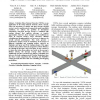Free Online Productivity Tools
i2Speak
i2Symbol
i2OCR
iTex2Img
iWeb2Print
iWeb2Shot
i2Type
iPdf2Split
iPdf2Merge
i2Bopomofo
i2Arabic
i2Style
i2Image
i2PDF
iLatex2Rtf
Sci2ools
140
click to vote
ICPPW
2009
IEEE
2009
IEEE
Improvement of Messages Delivery Time on Vehicular Delay-Tolerant Networks
Vehicular Delay-Tolerant Networks (VDTNs) are an application of the Delay-Tolerant Network (DTN) concept, where the movement of vehicles and their message relaying service is used to enable network connectivity under unreliable conditions. To address the problem of intermittent connectivity, long-term message storage is combined with routing schemes that replicate messages at transfer opportunities. However, these strategies can be inefficient in terms of network resource usage. Therefore, efficient scheduling and dropping policies are necessary to improve the overall network performance. This work presents a performance analysis, based on simulation, of the impact of different scheduling and dropping policies enforced on Epidemic and Spray and Wait routing schemes. This paper evaluates these policies from the perspective of their efficiency in reducing the message's end-to-end delay. In our scenario, it is shown that when these policies are based on the message's lifetime cr...
Related Content
| Added | 19 Feb 2011 |
| Updated | 19 Feb 2011 |
| Type | Journal |
| Year | 2009 |
| Where | ICPPW |
| Authors | Vasco Nuno da Gama de Jesus Soares, Joel José Puga Coelho Rodrigues, Paulo Salvador Ferreira, Antonio Manuel Duarte Nogueira |
Comments (0)

